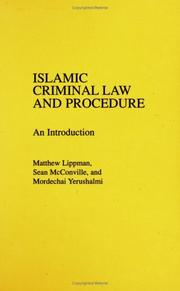| Listing 1 - 7 of 7 |
Sort by
|
Book
ISBN: 3631322178 Year: 1997 Publisher: Frankfurt am Main Lang
Abstract | Keywords | Export | Availability | Bookmark
 Loading...
Loading...Choose an application
- Reference Manager
- EndNote
- RefWorks (Direct export to RefWorks)
Malikites --- Procedure (Islamic law) --- History
Book
ISBN: 0815653190 9780815653196 9780815633945 0815633947 Year: 2015 Publisher: Syracuse, New York : Syracuse University Press,
Abstract | Keywords | Export | Availability | Bookmark
 Loading...
Loading...Choose an application
- Reference Manager
- EndNote
- RefWorks (Direct export to RefWorks)
In Pragmatism in Islamic Law, Ibrahim presents a detailed history of Sunni legal pluralism and the ways in which it was employed to accommodate the changing needs of society. Since the formative period of Islamic law, jurists have debated whether it is acceptable for a law to be selected based on its utility, rather than weighing conflicting articulations of the law to determine the most likely expression of the divine will. Virtually unanimous opposition to the utilitarian approach, referred to as "pragmatic eclecticism, " emerged among early Islamic jurists. However, due to a host of changing institutional and socioeconomic transformations, a trend toward the legitimization of pragmatic eclecticism arose in the thirteenth century. Subsequently, the Mamluk authorities institutionalized this pragmatism when Sultan Baybars appointed four chief judges representing the four Sunni schools in Cairo in 1265 CE. After a brief attempt to reverse Mamluk pluralism by imposing the Hanafi school in the sixteenth century, Egypt's new rulers, the Ottomans, embraced this pluralistic pragmatism. In examining over a thousand cases from three seventeenth- and eighteenthcentury Egyptian courts, Ibrahim traces the internal logic of pragmatic eclecticism under the Ottomans. An array of archival sources documents the manner in which Egyptian society's subaltern classes navigated Sunni legal pluralism as a tool to avoid more austere legal doctrines. The ensuing portrait challenges the assumption made by many modern historians that the utilitarian approaches adopted by nineteenth- and twentieth-century Muslim reformers constituted a clear rupture with early Islamic legal history. In contrast, many of the legal strategies exercised in Egypt's partial codification of family law in the twentieth century were rooted in premodern Islamic jurisprudence.
Islamic law --- Procedure (Islamic law) --- Jurisdiction (Islamic law) --- History.
Book
Year: 2019 Publisher: Washington DC : United States Commission on International Religious Freedom,
Abstract | Keywords | Export | Availability | Bookmark
 Loading...
Loading...Choose an application
- Reference Manager
- EndNote
- RefWorks (Direct export to RefWorks)

ISBN: 0275930092 Year: 1988 Publisher: South Hadley : Praeger,
Abstract | Keywords | Export | Availability | Bookmark
 Loading...
Loading...Choose an application
- Reference Manager
- EndNote
- RefWorks (Direct export to RefWorks)
Book
ISBN: 1527516938 1527503232 9781527516939 9781527503236 Year: 2017 Publisher: Newcastle upon Tyne, UK : Cambridge Scholars Publishing,
Abstract | Keywords | Export | Availability | Bookmark
 Loading...
Loading...Choose an application
- Reference Manager
- EndNote
- RefWorks (Direct export to RefWorks)
Book
ISBN: 235159052X 282181559X 2351592697 Year: 2007 Publisher: Presses de l’Ifpo
Abstract | Keywords | Export | Availability | Bookmark
 Loading...
Loading...Choose an application
- Reference Manager
- EndNote
- RefWorks (Direct export to RefWorks)
Most studies on Islamic, Arab and Ottoman societies are content with the role of testimony that texts available to researchers can play, thus reducing the role of text and language to a mimetic description of past events. The point here is to show that any understanding of social relations implies, first, to consider the textual production of a society by questioning the meaning assignable to the texts themselves. It also supposes that the analysis of texts, whatever their societal and institutional context, must consider its sources as discursive practices, in order not to reduce them to their preliminary function of factual testimony. Drawing on a wide variety of Ottoman "legal" texts produced in Beirut and Damascus in the 19th century, this book avoids linking these texts to the normative values of “Islamic law”, but on the contrary documents the way in which discursive practices operate concretely on a specific terrain. Different levels of practices then emerge, all documented by the social actors who made their very existence possible.
Judicial process (Islamic law) --- Procedure (Islamic law) --- Evidence, Documentary (Islamic law) --- Law, Politics & Government --- Canon Law --- Islamic law --- droit islamique --- économie --- waqf --- justice --- droit
Book
ISBN: 0379207451 Year: 1982 Publisher: London
Abstract | Keywords | Export | Availability | Bookmark
 Loading...
Loading...Choose an application
- Reference Manager
- EndNote
- RefWorks (Direct export to RefWorks)
Criminal law. Criminal procedure --- Criminal procedure (Islamic law) --- Criminal law (Islamic law) --- Procédure pénale (Droit islamique) --- Droit pénal (Droit islamique) --- Congresses --- Congrès --- 343 --- -Criminal procedure (Islamic law) --- -Islamic law --- Islamic law --- Strafwetenschappen--(algemeen) --- -Strafwetenschappen--(algemeen) --- 343 Strafwetenschappen--(algemeen) --- -343 Strafwetenschappen--(algemeen) --- Procédure pénale (Droit islamique) --- Droit pénal (Droit islamique) --- Congrès
| Listing 1 - 7 of 7 |
Sort by
|

 Search
Search Feedback
Feedback About UniCat
About UniCat  Help
Help News
News